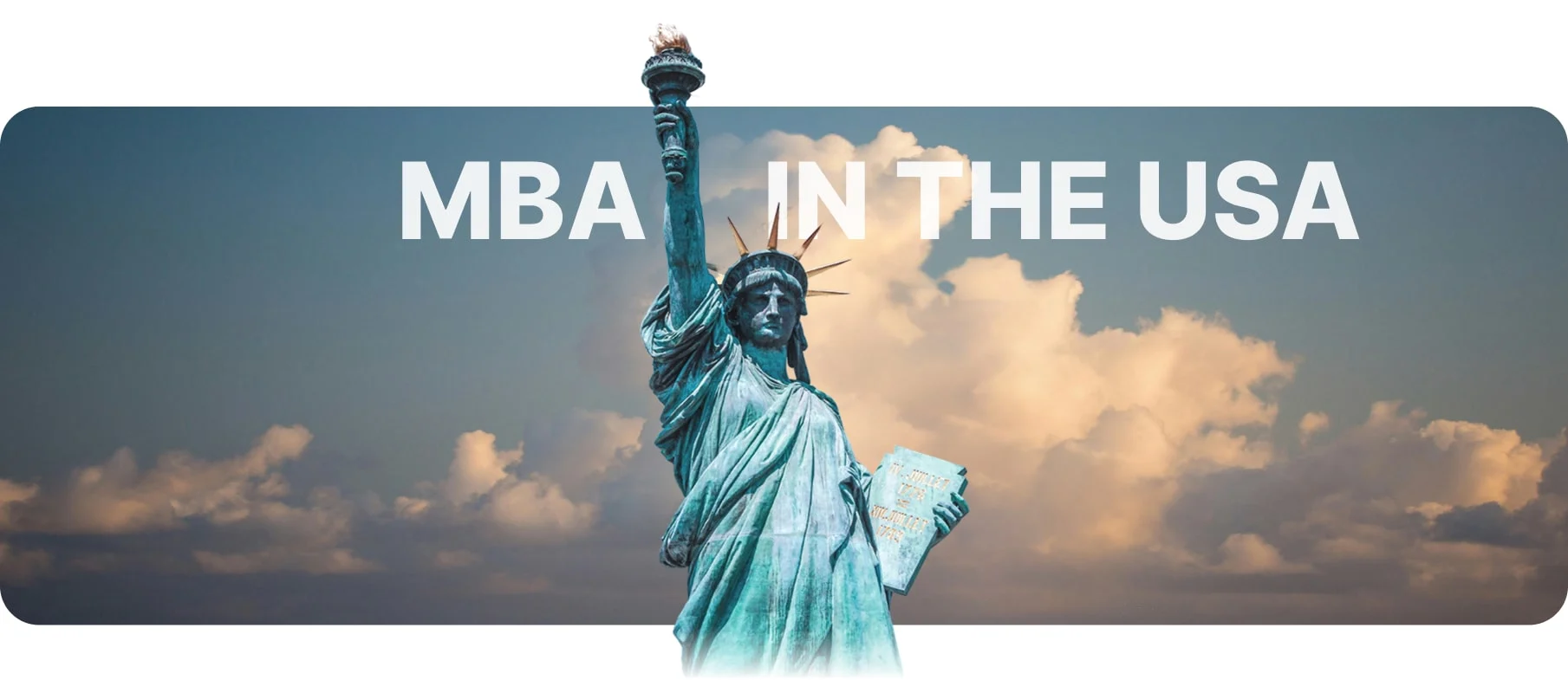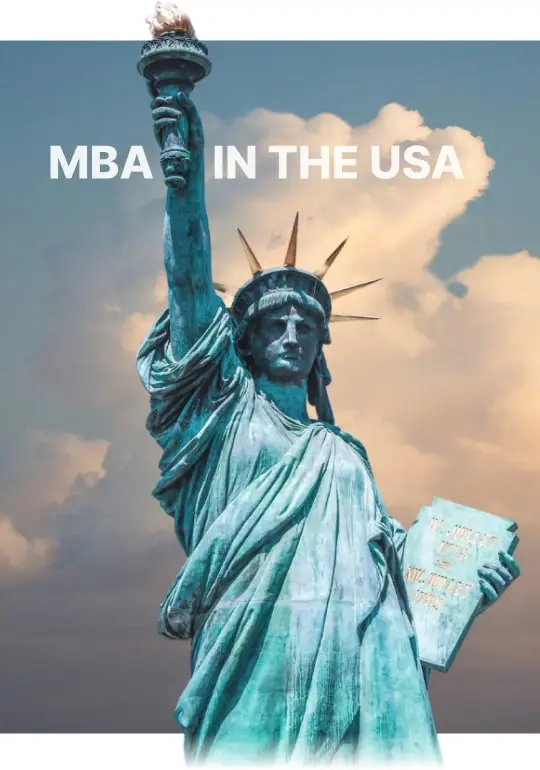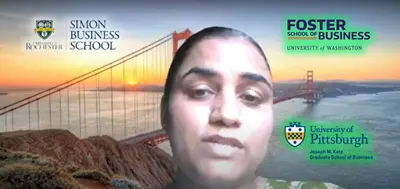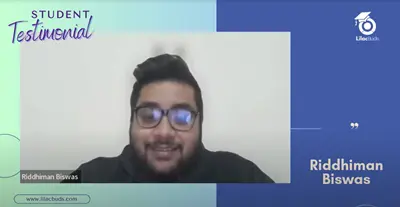

With 2000+ successful admits, MBA in USA remains a top choice for applicants of LilacBuds, a leading MBA admissions consultant. Renowned for its education system, inclusive culture, and job market, it’s ideal for launching your international career.
Top Universities
250+ Highly Reputed Business Schools – Includes globally ranked institutions like Harvard Business School, Stanford Graduate School of Business, etc
Flexible Programs & Degrees
Choose from Full-Time, Part-Time, Executive & Online MBA Options – Ideal for professionals at all stages, with tailored schedules to fit different career goals.
Average Expenses
Annual Tuition Fees range from $50,000 to $100,000 – Varies by university and program type.
Career Ready Experience
80%+ MBA Graduates Land Internships or Jobs Within 6 Months of Graduation – With access to a strong network of recruiters and industry leaders.
Visa & PR
Post-MBA work permits and PR pathways available for eligible students – Many programs offer routes to work experience and permanent residency.
Strong Job Market
Average Base Salary Post-MBA Ranges from $70,000 to $120,000 – Boost your earning potential with access to top employers across industries.
The United States is one of the most sought-after destinations for international students, offering a diverse range of academic opportunities, world-class universities, and unmatched career prospects. Home to some of the top MBA programs in USA it is known for its cutting-edge research, extensive resources, and a vibrant cultural experience. Studying in the US offers students the chance to develop both academically and personally in a dynamic environment.
Top Ranked Universities and Quality Education
The US is home to elite business schools like Harvard, Stanford, and Wharton. Known for academic excellence, US MBAs consistently top global rankings and attract employers worldwide.
Unmatched Research Opportunities
US B-schools lead in research across leadership, innovation, and business analytics. With advanced centers and corporate tie-ups, MBA students gain exposure to real-world problem solving.
Flexible and Diverse Programs
From traditional two-year MBAs to specialized one-year and executive formats, US schools offer flexible pathways. Students can customize electives, dual degrees, and career-focused concentrations.
Career-Boosting Internships and Networks
Internships are built into most MBA programs, giving hands-on industry experience. Powerful alumni networks and career services open doors to top firms in finance, tech, and consulting.
Rich Cultural Exposure and Diversity
With students from 150+ countries, US campuses promote global learning. The diversity fosters inclusion, cultural awareness, and prepares students for international leadership roles.
Vibrant Student Life
Whether at Ivy League campuses or tech hubs, students enjoy clubs, events, and travel. From business competitions to cultural fests, MBA life in the US blends fun with professional growth.
Our Smart MBA Match Tool analyzes your academic background, work experience, and test scores to recommend top-fit MBA programs across US business schools. Explore Dream / Reach / Safe options personalized to your goals and career plans. TRY THIS NOW – and discover MBA programs in the USA that match your aspirations and budget, and take the next step to study MBA in USA.
The application process for U.S. universities involves several critical steps, from gathering required documents to securing a student visa. Follow this guide to ensure that your journey towards studying in the U.S. is seamless and successful.
Prepare academic transcripts, GMAT/GRE scores, English proficiency scores (TOEFL/IELTS), resume, and essays for your MBA application.
Complete and submit online applications directly on university portals or through centralized platforms like Common App or BusinessCAS.
MBA application fees typically range from $100 to $250 per program, depending on the university.
Once selected, you’ll receive an official admission letter or email from the business school outlining the next steps.
Use the I-20 form provided by your university to apply for an F-1 student visa and schedule your interview at a U.S. embassy.
The admission requirements for MBA programs in the U.S. are designed to assess your academic background, work experience, and potential for success in the program. Here's an overview of the MBA requirements in USA and what you need to qualify for top US MBA programs.
Minimum GPA and Academic Eligibility
Most US business schools require a minimum GPA of 3.0 to 3.5. However, top-tier programs may look for higher academic performance, especially in quantitative subjects.
TOEFL/IELTS Requirements
Non-native English speakers must demonstrate English proficiency through TOEFL (minimum 90-100) or IELTS (minimum 6.5-7.0) scores, depending on the university.
Work Experience Requirements
A minimum of 2-5 years of full-time professional work experience is typically required for MBA applicants, with some programs valuing leadership roles or managerial experience.
GMAT/GRE Expectations and Waivers
Many schools require GMAT/GRE scores, with an average GMAT score ranging from 650 to 740. Some schools offer waivers based on professional experience, academic background, or a high GRE score.
Required Application Documents
Application documents generally include transcripts, GMAT/GRE scores, TOEFL/IELTS scores, resume, Statement of Purpose (SOP), Letters of Recommendation (LORs), and a completed online application.
Explore the academic vibrance of the United States by choosing from some of its top student cities. Each city offers unique cultural experiences, world-class universities, and abundant career opportunities for international students studying in the US.
Boston, often called the "Student Capital of America," is a vibrant academic hub known for its rich history, cultural diversity, and proximity to some of the best universities in the US.
New York is a global center for business, finance, and technology, offering access to top-tier MBA programs and unmatched networking opportunities in the heart of one of the world’s largest economies.
Known for its vibrant entertainment industry and tech growth, Los Angeles is a hub for innovation, diversity, and international students looking to shape the future of business.
Chicago is a major financial and business center, known for its dynamic job market and diverse cultural scene, making it an ideal place to pursue an MBA.
Located in the heart of Silicon Valley, San Francisco is perfect for aspiring entrepreneurs and tech leaders, offering unmatched access to global business networks and top tech companies.
Boston, often called the "Student Capital of America," is a vibrant academic hub known for its rich history, cultural diversity, and proximity to some of the best universities in the US.
New York is a global center for business, finance, and technology, offering access to top-tier MBA programs and unmatched networking opportunities in the heart of one of the world’s largest economies.
Known for its vibrant entertainment industry and tech growth, Los Angeles is a hub for innovation, diversity, and international students looking to shape the future of business.
Chicago is a major financial and business center, known for its dynamic job market and diverse cultural scene, making it an ideal place to pursue an MBA.
Located in the heart of Silicon Valley, San Francisco is perfect for aspiring entrepreneurs and tech leaders, offering unmatched access to global business networks and top tech companies.
Find the perfect program tailored to your goals. Discover detailed information on top universities, courses, fees, and more to kickstart your academic journey.
Tuition Fee
The tuition fees for studying an MBA in the U.S. vary significantly depending on the university, program, and whether the institution is public or private. On average, tuition fees can range from $20,000 to $80,000 per year. Below is a detailed breakdown:
Public Universities
Generally more affordable than private institutions, with fees typically ranging from $20,000 - $50,000 per year.
Private Universities
Tend to be more expensive, with fees ranging from $30,000 - $80,000 per year.
Student accommodation costs in the U.S. can range from $12,000 to $18,000 annually, depending on your living arrangements. The major components include:
Rent (on-campus or off-campus)
Utilities (electricity, water, gas, internet)
Food (groceries, dining out)
Travel (to and from your home country)
Other costs (books, personal)
Other monthly expenses can include:
Take-out food
Travel and vacation
Car rental/insurance (if applicable)
Entertainment/TV
Other costs (transport, personal)
International students pursuing an MBA in the USA have access to a wide range of scholarships that can significantly reduce the cost of education. These scholarships help cover tuition fees, living expenses, and sometimes additional costs like books and travel.
Awarded to students with exceptional academic achievements, leadership qualities, or professional accomplishments.
Designed for students who can demonstrate financial need as part of their application.
Offered by organizations outside the universities, such as foundations, governments, or NGOs.
Highly competitive scholarships awarded by the institution’s leadership to top-tier candidates.
Funded by companies to support future business leaders, often tied to specific industries or diversity initiatives.
Include diversity, country-specific, or gender-based scholarships not tied to merit or need alone.
Can international students work while pursuing an MBA in the USA?
Yes, international students on an F-1 visa can work up to 20 hours per week on campus during the academic term and full-time during scheduled breaks. Optional Practical Training (OPT) and Curricular Practical Training (CPT) also allow students to gain work experience during or after the program.
Is the GMAT or GRE mandatory for MBA admissions in the USA?
Most U.S. MBA programs accept either the GMAT or GRE. However, some universities offer test waivers based on professional experience, prior academic performance, or if the applicant holds an advanced degree.
What are the visa requirements for MBA students in the USA?
International MBA students typically need to apply for an F-1 student visa. After receiving an I-20 form from the admitted university, students must pay the SEVIS fee and attend a visa interview at a U.S. embassy or consulate in their country.
Connect with experienced mentors to get clarity on universities, applications, exams, scholarships, and career outcomes. Get personalized answers to all your questions about pursuing an MBA in the United States.
Explore flexible work options and gain valuable industry experience while studying abroad in the USA. From on-campus roles to internships, find opportunities that enhance your academic journey and career prospects.
Flexible Work Options
International MBA students on an F1 visa can work up to 20 hours per week during academic sessions and full-time during holidays, gaining experience while studying in the USA.
Optional Practical Training
OPT allows MBA students to work in their field of study for up to 12 months after graduation. STEM-designated MBA programs may extend OPT eligibility up to 36 months.
Let our AI University Finder classify programs into Dream, Reach, and Safe based on your academic and professional background.
Navigating the U.S. visa process is a critical step in your study-abroad journey. Here’s everything you need to know to get started with studying in the USA. Also, read our blog, "The US Student Visa Application Process & Checklist of Documents," makes it easier to understand.
Types of Visas
F-1 Visa (Academic Students)
The F-1 visa is required for international students enrolled in full time MBA or other graduate level academic programs in the US.
Cost - 160$
M-1 Visa (Vocational Students)
Typically not applicable for MBA programs. This visa is for non-academic or vocational training.
Cost - 160$
J-1 Visa (Exchange Visitors)
For MBA students participating in specific exchange-based MBA programs or internships under university sponsorship.
Cost - 160$
Requirements
To apply for an F-1 visa for an MBA program, gather the following essential documents:
Visa Application Process
Follow these key steps to apply for your U.S. student visa:
Visa Denials & Rejections
Though most MBA student visas are approved, rejections can happen due to:
Let Us Guide You Through the Process!
Get expert insights and personalized support to make your U.S. MBA visa journey smooth.
Here are some quick facts and stats about pursuing an MBA in the USA
The US has a diverse student body, with MBA students from all over the world, creating a global networking environment.
The U.S. is home to prestigious business schools like Harvard, Stanford, and Wharton.
Many U.S. MBA programs offer opportunities for internships with top companies in industries like finance, consulting, and tech.
U.S. MBA graduates have one of the highest starting salaries globally, with an average of $100,000+ annually.
MBA grads in the U.S. can work for up to 3 years post-graduation under OPT (especially if STEM-designated).
US MBA programs emphasize leadership, entrepreneurship, and innovation, making them ideal for future business leaders.
Student life in the U.S. is diverse, with a strong emphasis on academics, personal growth, and social activities. Universities offer robust support networks to help international students settle into both their academic and social environments, ensuring a smooth transition to studying in the USA.
Work-Study Balance
International MBA students can work up to 20 hours per week during semesters and full-time during vacations. Many take up on-campus jobs or internships to gain experience and support living costs while managing rigorous coursework.
Accommodation Options
Students in USA have a variety of accommodation choices, including on-campus residences, private rentals, and shared housing. Most first-year students who study in USA opt for university-managed housing for convenience and community living. In later years, many prefer private accommodations for greater independence and cost savings.
Cultural and Social Exposure
US campuses celebrate global diversity through cultural nights, leadership summits, and networking events. Students engage in clubs, case competitions, and conferences that enrich their learning and global perspective.
Student Blogs & Vlogs
Current MBA students often document their journeys via blogs and YouTube channels, offering real insights into workload, networking, recruitment, and life in the US. These resources help new aspirants plan better for their MBA experience.

MBA admit with scholarship from Foster School of Business! Without GMAT!

How Abhishek got an MBA Admit from UCLA Anderson with a $120k scholarship!

MBA Admit from Yale, Darden, and UCLA! With scholarship! Riddhiman's journey with LilacBuds